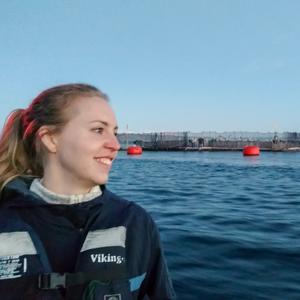Heidi Vesterinen, DVM, has a deeply rooted passion for the intersection of animal, human, and environmental health that began in her early childhood and has since brought her around the world. A resident in the Center for Animal Health and Food Safety (CAHFS) until January 2019, Vesterinen recently received funding from the Veterinary Pioneers in Public Health Fund to participate in Farm to Table, a week-long opportunity to investigate Chilean salmon, dairy, and beef production for export in Puerto Montt, Chile.
The week-long joint U of M and The Ohio State University farm to fork program allowed Vesterinen and her fellow participants to tour various facilities around Puerto Montt, a unique location due to its combination of sizable cattle and salmon production systems. “The idea was to get to know an exporting system―to see how it functions and compare it to the US,” she says. And since Vesterinen grew up on a dairy farm in Keuruu, Finland, she says she enjoyed the chance to compare the process to the European system as well.
After completing her DVM at the University of Helsinki in 2013, Vesterinen’s interest in veterinary public health has led her to the United Kingdom, India, Nepal, and now to the University of Minnesota. Her specific research interests include antimicrobial resistance, chronic wasting disease, and the dairy production system―topics that have proven to be universal across the global agricultural industry.
Vesterinen says her various travels have shown her that productive food animal agriculture can happen anywhere, if key factors are pulled together adequately. “The environment, the people, the skills are all there and as long as you harness them, you can make it happen anywhere,” she says.
The experience in Chile showed Vesterinen that there are multiple different ways to arrive at a solution. “Going on these trips gives you the opportunity to understand how others have solved similar issues,” she says. “It can also show you new ideas and best practices to help you make whatever you are doing better because you are being exposed to different ways of thinking and doing things. Cross pollinating across systems is always a positive thing.”
Get involved
If you are interested in supporting this fund, please contact the Center for Animal Health and Food Safety, at [email protected], or visit our Pioneer Fund donation page.
